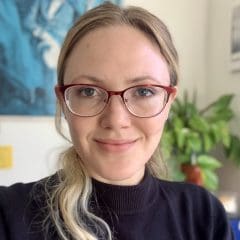The Intersection of Health and Peacebuilding. Member Spotlight: Anlan Cheney
A former epidemiologist, teacher, and peace studier, Anlan started her journey in mediation only recently. She brings a unique perspective to mediation as a “peace and health professional” who is active in developing this nascent area of interdisciplinary practice.
Background
 She began as a student journalist, writing articles for her rural community in Nebraska, USA, and pursued a bachelor’s degree in journalism at Oklahoma Wesleyan University. During her bachelor’s, Anlan had the fantastic opportunity to set foot in the field and go abroad to the Western Balkans where she stayed to pursue a master’s degree in the Regional Programme for Peace Studies at the University of Belgrade in Serbia. During that time, she interned for an NGO called World Learning and produced communications for their post-conflict leadership and education development project in Kosovo. She also helped organize a regional meeting of representatives of governments, businesses, the arts, and more in southeastern Europe during this time and worked as a teacher in South Dakota while writing her Master’s thesis, noting “a lot of mediation has to do with teaching and training skills that I was using for my teaching”.
She began as a student journalist, writing articles for her rural community in Nebraska, USA, and pursued a bachelor’s degree in journalism at Oklahoma Wesleyan University. During her bachelor’s, Anlan had the fantastic opportunity to set foot in the field and go abroad to the Western Balkans where she stayed to pursue a master’s degree in the Regional Programme for Peace Studies at the University of Belgrade in Serbia. During that time, she interned for an NGO called World Learning and produced communications for their post-conflict leadership and education development project in Kosovo. She also helped organize a regional meeting of representatives of governments, businesses, the arts, and more in southeastern Europe during this time and worked as a teacher in South Dakota while writing her Master’s thesis, noting “a lot of mediation has to do with teaching and training skills that I was using for my teaching”.
Later, Anlan undertook a master’s in public health with a specification in epidemiology at the University of Nebraska Medical Center because she was attracted to the multidisciplinary approach and technical skills taught in public health programs – data analysis and project management among them.
During her public health studies, Anlan interned with the Clinton Health Access Initiative in Zimbabwe, analyzing HIV/AIDS data remotely, and earned a global health fellowship in India with CHD Group (Center for Health and Development). She also worked for her university’s first international office to develop global partnerships and programs, which was another excellent opportunity to hone cross-cultural and interpersonal diplomacy skills. Her new path turned out to be a fortuitous choice, and she was employed as an epidemiologist with the CDC Foundation shortly after graduating in May 2020, supporting her state and local health departments to stem the spread of Covid-19. While working in the pandemic response, Anlan realized “it was so obvious to me how the communication side of public health is often really struggling in … engaging with people, engaging with the media”. She was drawn again to journalism and moved to San Francisco, California, to intern as a community health reporter at Mission Local until earlier this year.
Current Work
Nowadays, Anlan is delighted to focus on work which bridges her peace and public health backgrounds. Through the Peace Caucus in affiliation with the American Public Health Association and the Physicians for Social Responsibility #DemandAccess campaign, she works to educate and mobilize health professionals, students, and interdisciplinarians about their role in preventing – not just treating – the health harms of conflict, war, and structural violence. Earlier this month, she began a new role as nuclear weapons abolition organizer with the San Francisco Bay Area chapter of Physicians for Responsibility, the American affiliate of International Physicians for the Prevention of Nuclear War (IPPNW). IPPNW’s early efforts to bring Russian and American scientists together to raise their voices against the harms of nuclear weapons during the Cold War, as well as contemporary efforts by health professionals around the world, are an enduring inspiration as she develops and applies mediation skills in health and peace practice.
This summer, Anlan completed her first mediation course certificate with Community boards, a program well known for training community-based mediators. She was drawn to MBBI after finding their Health & Conflict Working Group through an internet search. Professionals engaged on these topics are fairly atomized, Anlan said, so she started a Health & Peace Professionals LinkedIn group this summer to encourage better communication, networking, and sharing of resources.
Advice for new/young mediators
The best advice she got for another mediator was “don’t quit your day job.” Anlan also recommends new mediators not to stress about “staying in their lane”, because diversifying and interdisciplinary collaboration is essential. By doing so, Anlan developed a diverse set of skills and cultural and professional sensitivities. She briefly considered pathways through law and the foreign service to practice mediation, but – like in the peace and health space – she is charting her own path.
Article by Sarah Vorms, MBBI Writer
